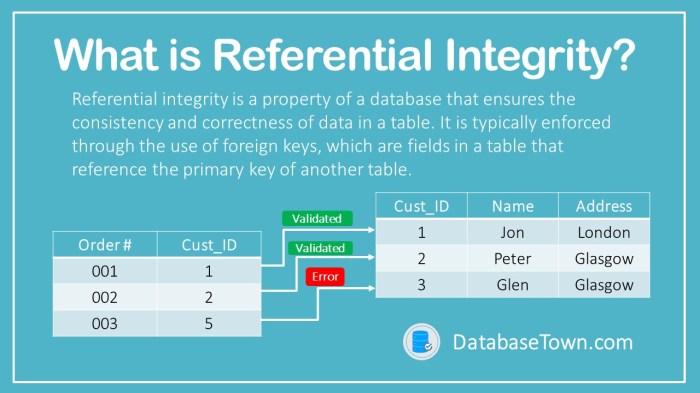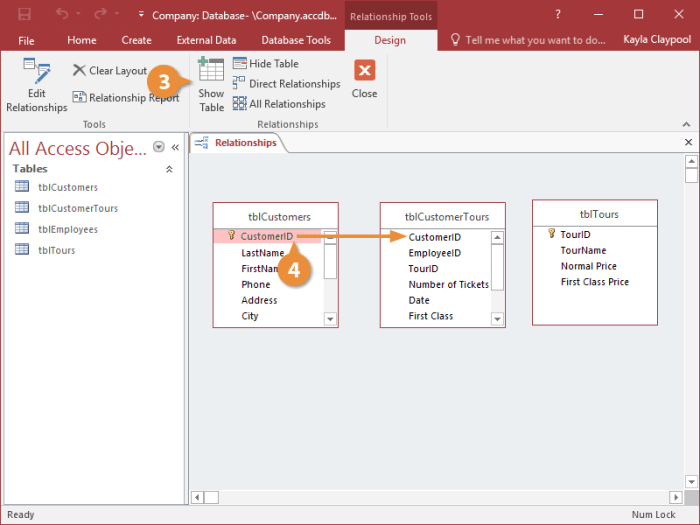Rdbmss enforce integrity rules automatically. – RDBMS enforce integrity rules automatically, setting the stage for a discussion on the crucial role of integrity rules in Relational Database Management Systems (RDBMS). These rules safeguard data accuracy, ensuring that data remains consistent and reliable, a cornerstone of effective data management.
Integrity rules come in various forms, including primary key constraints, foreign key constraints, unique constraints, and check constraints. RDBMS automatically enforce these rules, checking data against them to prevent errors and maintain data consistency. This automated enforcement offers significant benefits, reducing data errors, improving data consistency, and increasing data reliability.
Introduction to RDBMS Integrity Rules: Rdbmss Enforce Integrity Rules Automatically.

Relational Database Management Systems (RDBMS) are software systems designed to manage and store data in a structured and organized manner. Data integrity is of paramount importance in RDBMS to ensure the accuracy, consistency, and reliability of the stored data. Integrity rules play a crucial role in safeguarding data integrity by enforcing specific constraints and validations on the data.
Integrity rules define the conditions that the data must satisfy to maintain its validity and consistency. These rules are enforced automatically by the RDBMS, ensuring that data entered into the database adheres to the defined constraints.
Types of Integrity Rules
There are various types of integrity rules that can be applied to data in an RDBMS. Some common examples include:
- Primary key constraints: Ensure that each row in a table has a unique identifier, preventing duplicate records.
- Foreign key constraints: Establish relationships between tables, ensuring that data in one table references valid data in another table.
- Unique constraints: Prevent duplicate values within a specified column or set of columns.
- Check constraints: Enforce specific conditions or rules on the data, such as ensuring that a value falls within a certain range or matches a specific pattern.
Automated Enforcement of Integrity Rules
RDBMS automatically enforce integrity rules by checking data against the defined constraints during data insertion, update, or deletion operations. If a data value violates any of the rules, the operation is rejected, and an error is reported.
The automated enforcement of integrity rules provides several benefits, including:
- Reduced data errors: By preventing invalid data from being entered into the database, integrity rules minimize the risk of data corruption and errors.
- Improved data consistency: Integrity rules ensure that data across different tables and columns remains consistent, preventing inconsistencies and data anomalies.
- Increased data reliability: By enforcing data integrity, RDBMS ensure that the data stored in the database is reliable and can be trusted for decision-making and analysis.
Exceptions to Integrity Rules, Rdbmss enforce integrity rules automatically.
While integrity rules are essential for maintaining data integrity, there may be situations where it is necessary to override or bypass these rules. Some examples include:
- Data migration: During data migration from legacy systems or external sources, it may be necessary to temporarily disable integrity rules to allow the import of data that does not conform to the defined constraints.
- Exceptional circumstances: In rare cases, it may be necessary to override integrity rules to accommodate exceptional circumstances, such as correcting erroneous data or handling data that falls outside the normal constraints.
Overriding integrity rules should be done with caution and only after careful consideration of the potential risks and implications.
Best Practices for Managing Integrity Rules
To ensure effective management of integrity rules, it is important to follow best practices, including:
- Regular review and maintenance: Integrity rules should be reviewed and updated regularly to ensure they remain aligned with the evolving data requirements and business rules.
- Optimization: The performance of integrity rules can be optimized by creating indexes on columns involved in the constraints and using appropriate data types.
- Documentation: Clear and concise documentation of integrity rules is essential for understanding their purpose, scope, and impact on the data.
Common Queries
What are the benefits of automated enforcement of integrity rules?
Automated enforcement reduces data errors, improves data consistency, and increases data reliability.
What are some examples of integrity rules?
Primary key constraints, foreign key constraints, unique constraints, and check constraints are common examples of integrity rules.
How can I optimize the performance of integrity rules?
Regular review and maintenance, as well as adhering to best practices, can help optimize the performance of integrity rules.


